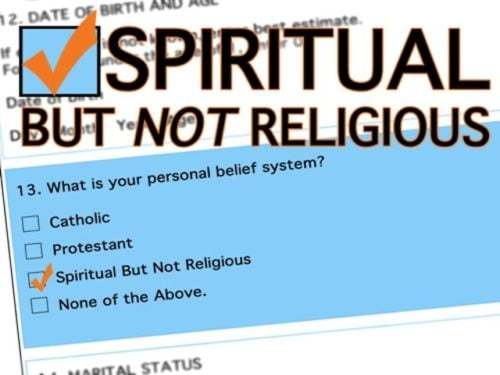A sermon preached at North Chevy Chase Christian Church in conversation with James 1:17-27
 "I'm Spiritual but not Religious" is among the most commonly cited reason why people don’t come to church. Over the years, I've heard:
"I'm Spiritual but not Religious" is among the most commonly cited reason why people don’t come to church. Over the years, I've heard:
“Pastor, I don’t think I need to come to church. I’d rather commute with God by watching the birds on Sunday. This is my spirituality.”
“Pastor, I don’t think I’m coming to come to church anymore. It’s nothing against you or the church people. You all are nice and all. I just don’t need a church for my faith.”
“Pastor, I just don’t know how you can stand working for the church. Have you read history books? Have you read the news lately? The church hurts people. I just don’t get how you could be in the ‘religion’ business.”
But, today, I’m musing about this statement, “I’m spiritual but not religious” in hopes of opening up a larger conversation because I've grown weary of the debate.
I want to start by saying that I believe "spiritual but not religious folks," are good people too. They aren't all anti-Jesus. Their lives aren’t completely void of faith practice. In fact, their lives are often full of good and God fearing things. Many seriously pray, read, meditate, etc. with great furor and discipline our scriptures.
So I don’t necessarily think the excuse of “I’m Spiritual but not Religious” is about laziness—but in many cases their devotion to God puts those of us who are “religious” to shame.
But, even with this true—we in the church often feel like our "spiritual but not religious" friends are like the distant step child that we’d just wish would get with the program, stop being so independent and critical of our structures and join our membership rolls.
We often feel tempted to criticize their faith, especially as their attitude of “My faith can survive without your unnecessary institution” seems like a big slap in the face, to what we’ve worked so hard to hold together all of these years.
We feel tempted to talk about their egos without even considering our own.
And even worse, our culture seems to be in their side with the assumption that spirituality is good; religion is bad.
Or, spirituality equals pure faith and God’s presence. Religion equals corruption, human made flawed structures. We find religion in churches. We find God in spirituality.
Yet the book of James has a lot to offer us here.
And while it’s a book that Martin Luther was known to say is the “epistle of straw” saying that its practical approach to faith is not theological enough—I believe that James is an amazing ancient text wrestling what might not be truly modern problem after all.
James wrote to a community of believers concerned about the essence of faith.
In James' time were many who said: “We’d better get our theology in order. We need to write more doctrine.”
And there were others who said, “Theology is well and good, but what does it mean? What does it look like?”
And to these questions James re-directs the conversation back to God. If I were to sum up the entire book for you it would be this: "It's not that I want to throw out all the great work that Apostle Paul has done in other letters helping us to define the essence of faith. But, I do want you to know how to LIVE OUT YOUR FAITH."
For you can talk a good game for a long as you want, have all the right answers with what you think Jesus meant about this and that, but if your life doesn’t SHOW what you believe then it’s all rubbish.
Pure rubbish.
He writes in chapter 1 verses 26-27: “If any think they are religious, and do not bridle their tongues but deceive their hearts, their religion is worthless. Religion that is pure and undefiled before God, the Father, is this: to care for orphans and widows in their distress, and to keep oneself unstained by the world.”
James is saying that religion’s sake is worthless. It’s a simple but profound truth.
For, if we keep up tradition, for tradition’s sake, it’s worthless.
If we conduct church business in a particular way because it how they did it back in 1995, it’s worthless.
If we maintain our buildings for the sake of maintaining our buildings, then it’s worthless.
If we do a program in the church simply because it went over well last year, it could be worthless too.
For James wants us to consider WHY we do what we DO. For going through the motions is not faith. It’s religion.
In my work with churches during interim times, I’m often pushing church leaders to wrestle with questions like this (and sometimes making people mad in the process):
“Why do we always to have all of these standing committees? Why do we keep these bylaws around though they were written for a church 3x our size?”
“Why do we keep on programs that no one attends?”
“Why do we only welcome people who look like us? Why do we not push outside our comfort zones?”
I ask questions to push congregations to consider how well-meaning structures and activities have become “going through the motion activities” instead of active faith . . . the kind of faith where we are living out the gospel: good news for all who hurting the most.
Let me stop here and say that I’m not saying structures are bad. Rather, mindless choices we make in the name of religious tradition never up for reconsideration are. For sometimes traditions and religious teaching and practice can be indeed just this—practice from human hands, flawed and in need of a fresh wind of the Spirit upon it over time.
Because don’t we believe that Spirit is always at work in our world? Don't we believe that God can always do a new thing?
And if this is true, then what God wanted from us and what we spent so much time building in 1980 might not be what God wants from us in 2016, right?
When it all boils down to it—I believe James begs the church of his day and the church of our day to ask ourselves—are you spinning your wheels on building up what matters or are you just spinning your wheels?
Is our religion that of caring for orphans and widows i.e. those in need of compassionate justice in this world, the most vulnerable?
Or is our religion that of building bigger buildings and structures that leave a mark of “we were once here?”
For, if our life together in community falls more in the second camp then, James tells us to re-think our religion.
Anytime I do a funeral service, I find myself repeating a phrase of exhortation to the mourners—a phrase, I hope at least some of them might remember later because it asks them to channel the grief and loss in life well lived in the here and now. I guess I should get some new material but I can’t seem to find a better way to say it.
“When you and I die, only one thing matters: not how much money we have, not how many flowers decorate the alter, not how many people attend, not how many groups or societies we belonged to—only one thing—is it well with our souls? Are our lives in harmony with God? What will profit a man or woman if he or she gains the whole world and loses their own soul?”
To me this is the important stuff of life: is it well with our souls?
So, this brings me to the place where I really want to say to those people who tell them they are too spiritual for church—I understand. I hear your frustrations.
I realize the church can be a messed up place where we don’t talk enough about how things are with our souls. Institutions are like this. Sometimes we make good decisions that bring us together and other times we miss the mark painfully by spending TOO much time organizing ourselves.
But, I also believe the church is where God wants to teach us. Is the church perfect? No. Has it made way more mistakes in its formation, declarations, and judgments than it has for the good of the world? Probably.
Yet, I won’t leave the church, though; it might be a lot easier in the short turn with a lot less meetings (I mean A LOT less meetings!)
Why? My faith is communal. It’s communal with the saints and sinners who have gone before me. I believe the Christian journey,  like that of the Jewish journey or the Muslim journey, is one at requires a lot more “we” than “I.” I need the church’s religion for my spirituality to have a home.
like that of the Jewish journey or the Muslim journey, is one at requires a lot more “we” than “I.” I need the church’s religion for my spirituality to have a home.
So as you read this my friends, may we not just be those who listen to the word, but are those who DO what it says. This means putting away the excuse or the debate of spiritual vs. religious and getting to work.
Getting to work to bless the homeless.
Getting to work to bless the lonely.
Getting to work to bless the dying.
Getting to work to bless the children.
Getting to work to bless the stranger.
Let us get to work! Let us put away the excuses. And let us live out our faith as the Spirit leads us.
Knowing that no mater if our church building are ever full again-- the calling still remains. Are we listening to the Spirit? Is it well with our souls? Are we blessing who need a blessing the most?
This is our faith. Let's get to work.